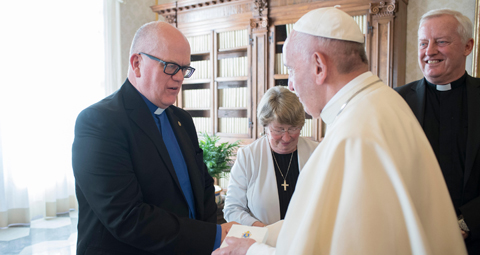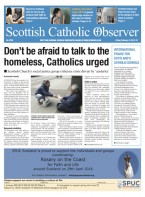BY Daniel Harkins | January 26 | ![]() 0 COMMENTS
0 COMMENTS ![]() print
print

Church of Scotland’s ‘profound regret’ of historical sectarianism
A senior Church of Scotland minister has said there is ‘profound regret’ in his Church over historical anti-Catholicism in Scotland.
Speaking during Christian Unity Week, Rev Dr John McPake, the Church of Scotland’s ecumenical officer, also said he believed the religious element of sectarianism in Scotland had ‘largely disappeared.’
“There is profound regret at any act of discrimination and if the Church of Scotland had been part of that or sustained any language that supported that then that would be a matter of profound regret,” he told the SCO.
An infamous report, The Menace of the Irish Race to our Scottish Nationality, was presented to the Church of Scotland assembly in 1923. Catholics would suffer widespread structural discrimination in Scotland, particularly in employment, into as late as the 1960s.
The two churches, Rev McPake said, now need to work together in an increasingly secular country.
“We in Scotland are faced with changed times,” he said. “Neither of us are as strong as we once were. Societal norms have changed. We are in a situation were we have to articulate our faith in a secular society and we do that better in partnership than in isolation.”
Rev McPake previously served in a church in East Kilbride while the then-Fr William Nolan—now Bishop of Galloway—was serving nearby in Our Lady of Lourdes. The two men worked on anti-sectarianism projects, taking schoolchildren to Glasgow cathedrals.
In October last year, Rev McPake met Pope Francis during the Holy Father’s meeting with the Church of Scotland Moderator, and he said the Pope had ‘done his homework’ on the Church of Scotland and was very welcoming.
Rev McPake said that while sectarianism has not gone away and ‘continues to raise its head,’ the ‘vast majority of sectarianism’ in Scotland is ‘no longer motivated by spiritual faith but is ‘animated by historical division.’
He pointed to poverty as one cause of the problem, saying that ‘sectarianism is found where communities are broken and divided for other reasons,’ adding that we have ‘common cause in building resilient communities which share in economic and social growth.’
“Within Church of Scotland circles I have not heard for a very long time any references that I would have thought to be sectarian in nature,” he added. “Our world has changed and changed for the better.”
To illustrate his point, he said that during the Year of Mercy both he and other ministers in Scotland had preached using the theme established by Pope Francis.
“In previous generations how many Church of Scotland ministers would have taken a theme identified by a pope as one on which they should have preached on?” he asked. “Language indebted to the Catholic communion actually has profound resonance with other communions within the Christian Church.”
Rev McPake said unity between the Churches in Scotland should be a priority and that pilgrimage was a great way to strengthen links between Christians.
“There is something to be said for the symbolism of a shared journey—for an opportunity to reflect on the fact that what we hold in common is greater than what divides us,” he said.











